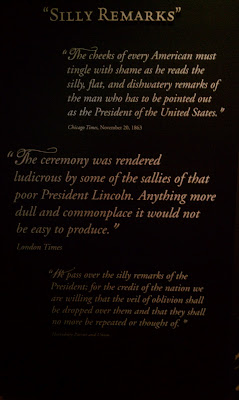The document amazes me. Lincoln uses the address to challenge and inspire us to press on in our own legacy-making, our own freedom-fighting, our own responsible citizenship so those honored dead "shall not have died in vain." It's a speech so deeply embedded in the past (four score and seven years ago, our fathers brought forth on this continent), but so simultaneously lodged in a future Lincoln could not yet see (that this nation, under God, shall have a new birth of freedom). That double vision is what the study of history so often offers.
 As I turn from the wall displaying the text of the Gettysburg Address, I face an opposing wall of quotations others have made at the time of Lincoln's speech. It's difficult to see with this cell phone photo, but these quotes refer to the short speech as a bunch of "silly remarks." One newspaper says that "every American must tingle with shame as he reads the silly, flat. . . remarks." Another comment claims that Lincoln's remarks will "no more be repeated or thought of" in American history.
As I turn from the wall displaying the text of the Gettysburg Address, I face an opposing wall of quotations others have made at the time of Lincoln's speech. It's difficult to see with this cell phone photo, but these quotes refer to the short speech as a bunch of "silly remarks." One newspaper says that "every American must tingle with shame as he reads the silly, flat. . . remarks." Another comment claims that Lincoln's remarks will "no more be repeated or thought of" in American history.I take a picture. I laugh at the irony. There will always be haters. There will always be opposition to the good, the noble, and the true. Perhaps the amount of criticism directly correlates to how good, noble, and true a thing is.
Living with flair means we move on in our legacy-making and our freedom-fighting despite opposition. What others claim is "dull and commonplace" just might change a nation's history.

5 comments:
I love this kind of poetic justice.
(Had to use that phrase, under the circumstances. After all, I came over through Glynn's Random Acts of Poetry :)
The other speaker at Gettysburg -- Edward Everett, a famous orator of the time -- spoke for two hours. The newspaper editorialists and pundits raved about his speech. Today, no one remembers anything about it -- or the orator himself. But he knew what Lincoln had accomplished -- and told him that he, Lincoln, had done in two minutes what he, Everett, had tried to do in two hours.
Poetic justice indeed! Nice comment! I did learn that about Everett. Funny how "good" doesn't mean long. Short and sweet can bring the point home.
Thank you for another insightful post on life. This is my first comment but there are so many more I've wanted to thank you for. Keep posting your thoughts--your perspective is refreshing!
I took a few minutes to read the Gettysburg Address again. It's so moving now, it's hard to believe it was once thought that it would be forgotten.
It's also moving to me in a very personal way as we approach the anniversary of Justin's death in Iraq..."that these dead shall not have died in vain."
Post a Comment